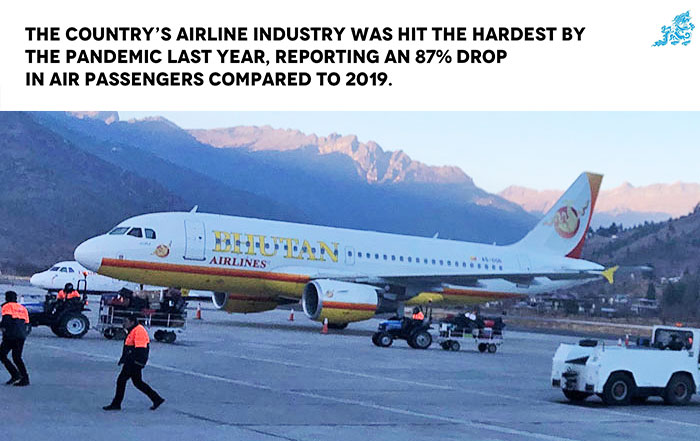Phub Dem | Paro
The advent of novel coronavirus hit the airline industry in the country the hardest last year with around 87 percent drop in air passengers compared to 2019.
According to the Ministry of Information and Communications (MoIC) annual Info-Comm and transport statistical bulletin 2021, Drukair and Bhutan Airlines together carried 49,212 international air passengers, excluding passengers carried on international connecting routes, in 2020.
The number of international passengers reduced significantly from 368,023 in 2019 to 49,212 in 2020.
Similarly, international passengers using Bhutanese airlines for connecting flights also reduced significantly by 75 percent from 5,108 in 2019 to 1,249 last year.
Bhutan is not alone. As per the International Civil Aviation Organization (ICAO), the world, on average, experienced a 60 percent reduction in international air passenger travel.
The local aviation industry focused on transporting cargo amid travel restrictions. The MoIC report shows that cargo flight increased by 101,775 last year, although it is still lesser than in 2018.
The absence of foreign tourists also hit the domestic sector which recorded a decline in its passengers. The share of domestic passengers decreased by about 59 percent in comparison to 2019. Only 6,509 domestic passengers availed of the service.
Currently, Drukair is the only domestic air service provider since it started flying to Bumthang and Younphula in 2011.
According to Drukair Chief Executive Officer Tandi Wangchuk the airline was severely affected among the Druk Holding and Investment (DHI) companies, because the pandemic has cut off its primary source of revenue completely.
The airline’s passengers dropped from 249,474 in 2019 to 39,870 in 2020 incurring a loss of Nu 814.49 million. Most passengers in 2020 were mainly those returning home in repatriation flights.
Drukair projected a revenue of Nu 5.7 billion, but it generated a total revenue of Nu 1.4 billion only.
Similarly, Bhutan Airlines had to bear the pressure of substantial refunds to customers and having to pay liabilities to the bank due to the pandemic.
Bhutan Airline’s Chief Executive Officer Phala Dorji said that with the discontinuation of the flight, the company was primarily dependent on borrowing from the banks and funds from the owner.
In contrast to the report, he said that the company’s passenger numbers were reduced by 90 percent. “Except for a few repatriation flights, there has been no operation since March 6.”
According to records with Bhutan Airlines, the passenger forecast for 2020 was 145,000 passengers, but the airline saw only 14,000 passengers last year. The revenue dropped to Nu 135 million against its projection of Nu 2.4 billion.
While the number of flights reduced significantly, both airlines had to carry out regular maintenance, which constitutes a significant part of their expenditure. Bhutan Airline has to pay for the rental of two airbuses.
Austerity measures
Apart from a voluntary pay cut of the employees, Drukair recalled almost all station managers posted outside.
Tandi Wangchuk said that the interim austerity measure came as a huge relief to the company, saving it Nu 5.8 million every month. He said that laying off expat Airbus captains saved the company Nu 8.11 million every month.
“The company has discontinued selective allowances, deferred leave encashment, and provided incentives for those taking leave without pay and extraordinary leave,” Tandin Wangchuk said.
In the meantime, Druk Gyalpo’s Relief Kidu on loan interest payment has reduced the airline’s expenses by Nu 134 million last year.
Without business for more than a year, Bhutan Airlines laid off around 30 employees who were on leave without pay, and the remainingreceived half their payment.
Phala Dorji said that although the laid-off employees were given the alternative to join the sister companies under Tashi Group, some refused.
He said that the company was grateful to Druk Gyalpo’s relief kidu for repaying the interest the company borrowed to sustain and operate, amounting to more than half a billion. “We are thankful to the banks for giving the working capital with the reduction of 50 percent interest.”
Safety measures
According to the CEO, as Drukair mainly operates relief flights to bring in Bhutanese from countries with high Covid-19 cases, the airline is taking extreme precautions.
He said that every airbus uses AMS 1453 disinfectant to clean after every relief flight.
According to the two CEOs, flight attendants use gloves, shoe cover, gown, face mask, hair net, and eye shield. “Reusable items like newspapers and magazines are discontinued, and meals are replaced with heavy snacks served in disposable settings. Passengers are also provided with face masks and gloves where required.”
Besides, as per the company’s standard operating procedure (SOP), the airline management divided the flying crew into sets whereby only one crew set is on active duty for two weeks.
Tandi Wangchuk said that the crew on duty were also placed in quarantine centres on company’s expenses. “Upon completion of their active two-week duty, the crew are further quarantined for two weeks and tested for the virus before they return home.”
Phala Dorji said that his company had been following strict SOP as per the international standard and the government’s directives.
Recovery plans
Although it has become evident to frame a roadmap to promote a sustainable trajectory for the aviation industry, Drukair is studying the situation and going to develop a recovery plan in collaboration with DHI.
According to Bhutan Airlines’ advisor and Executive Director Tshenchok Thinlay, a considerable chunk of funds was lost in sustainability. “The effort is to survive through the pandemic and to resume the business helping the economy.”
He said that without a specific timeline when the country will open to travel, it was challenging to plan a way forward. He added that the company’s effort would depend on the government’s directive and international protocol.
“The biggest challenge is not knowing when the operation will begin,” he said.


